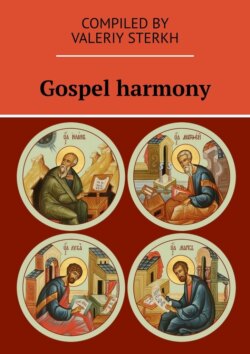Читать книгу Gospel harmony - Valeriy Sterkh - Страница 5
Part 1. Stating the facts
The Gospel of Matthew
ОглавлениеThe Gospel of Matthew was written about the third quarter of the 1st century. Tradition holds that it was written by Levi Matthew, the son of Alphaeus, one of the Twelve (see Mt 9:9; Mk 2:14; Lk 5:27). Originally it was written in the old Hebrew, but later it was translated into Greek and became widely accepted.
«So, Matthew wrote the Gospel for the Jews in their own language, while Peter and Paul were preaching in Rome and founded the Church» (Irenaeus of Lyons. Against Heresies, 3.1.1; compare Eusebius of Caesarea. Church History, 5.8).
«Initially Matthew preached the Gospel to the Jews; but then he took it to other nations, though it was written in his own tongue. When summoned to go elsewhere, he left them with his Scripture» (Eusebius of Caesarea. Church History, 3.24.6).
«Matthew the Apostle, who was also called Levi, used to be a tax-collector; he complied the Gospel of Jesus Christ for the sake of spiritual cleansing of believers. At first, it was published in Judea in Hebrew, but later someone translated it into Greek [compare Eusebius of Caesarea, Church History, 3.39.16]. The Hebrew version survived to the present day [around the beginning of the 5th century] in the Library of Caesarea [Caesarea of Palestine], so arduously created and maintained by Pamphilus [of Caesarea]. I also had the opportunity to get the book described for me by the Nazarene from the Syrian town of Berea who had been using it. It must be noted that this Gospel-writer, in quoting the Old Testament testimonies, whether himself or on behalf of our Lord and Savior, always follows the Hebrew text of the Covenant, not the authority of the translators of the Septuagint. Therefore, there are the following two versions: «Out of Egypt I have called my son» [Mt 2:15; Hos 11:1] and: «He will be called a Nazorean» [Mt 2:23; Is 11:1 <heb. «NZR» = Nazorean, a sprout, a root>; compare Num 6:21; Judg 13:5; 1 Sam 1:11; Am 2:11—12]» (Jerome of Stridon. On Famous Men, 3).
In his work, Matthew lavishly quotes from the Tanakh (the Hebrew Old Testament) making a special emphasis on the Messianic prophecies and their fulfillment in Jesus. Matthew is the only one who, in the account of his call to the apostleship, quotes the following words of Jesus: «But go and learn what this means: «I desire mercy and not sacrifice’" (Mt 9:13; compare Hos 6:6). None of the parallel accounts in Mark or Luke catch this nuance (see Mt 9:9—13; Mk 2:13—17; Lk 5:27—32). For the same reason, Matthew begins his Gospel with the genealogy of Jesus, starting with Abraham and going through David – from whom, according to the prophecies, the Messiah would come.
Matthew wrote his Gospel for the Jews – that’s why he avoids using the Hebrew word for «God», which would have been a taboo among the Jews. Besides, he uses the phrase «the Kingdom of God» instead of «the Kingdom of Heaven» unlike other evangelists. Exceptions to this rule most likely arose during the process of translating this Gospel into Greek.
